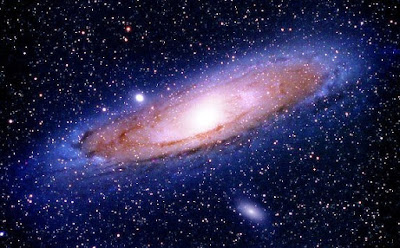 A few months ago I ran across an interesting story in which a new theory in the field of astrophysics was emerging, and it was that the planet Earth was possibly located inside of a gigantic "cosmic bubble." What intrigued me the most about this new theory was the following statement made by researcher Timothy Clifton of Oxford University in England:
A few months ago I ran across an interesting story in which a new theory in the field of astrophysics was emerging, and it was that the planet Earth was possibly located inside of a gigantic "cosmic bubble." What intrigued me the most about this new theory was the following statement made by researcher Timothy Clifton of Oxford University in England:"This idea that we live in a void would really be a statement that we live in a special place," Clifton told SPACE.com. "The regular cosmological model is based on the idea that where we live is a typical place in the universe. This would be a contradiction to the Copernican principle."
You see, the Copernican principle states, in brief, that our place in the universe is not special. When Nicholas Copernicus argued that it made much more sense for the Earth to be revolving around the sun than vice versa, it revolutionized science. Since then, most theories have to pass the Copernican test. If they require our planet to be unique, or our position to be exalted, the ideas often seem unlikely and are routinely rejected. Hence, theories involving ideas such as "dark matter" and "dark energy" have been postulated to try and explain the apparent acceleration of the universe as it is expanding. However, if the "cosmic bubble" theory is correct, then items in space could look farther away than they really are and there would be no need to rely on "dark energy" as an explanation for certain astronomical observations.
But if we happened to be in a portion of the universe with less matter in it than what is normal throughout the universe, then the space-time field around us would be different than it is outside of the "cosmic bubble," because matter warps space-time. Light traveling from an object such as a supernova outside our "cosmic bubble" would appear to be dimmer because the light would diverge more than we would expect once it got inside our void. "If we lived in a very large under-density," said Clifton, "then the space-time itself wouldn't be accelerating. It would just be that the observations, if interpreted in the usual way, would look like they were."
Although it is true that the Earth does orbit the sun, the Copernican principle did give rise to the idea that the Earth was not a special world, but that it just "happened." This meant that mankind was also simply an "accident," and we held no place of honor in the universe. But all of this runs counter to what we are told in God's word. God says we are special because we were made in His image, and this world was given to us as a gift from Him. We were so special that God was made in the image of man in the form of Jesus Christ so that we can be redeemed by His shed blood.
Is it not amazing how often science actually confirms God's holy word, in spite of their best efforts to the contrary to deny His existence?
No comments:
Post a Comment